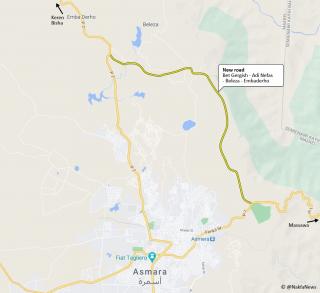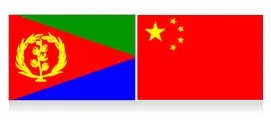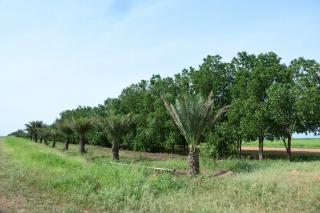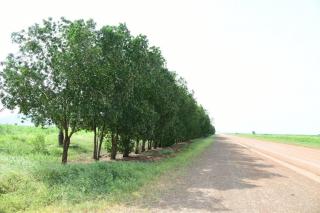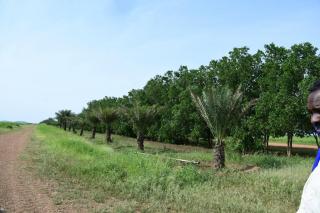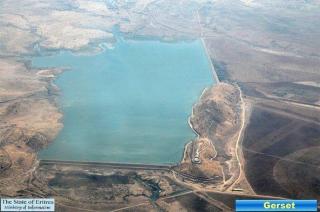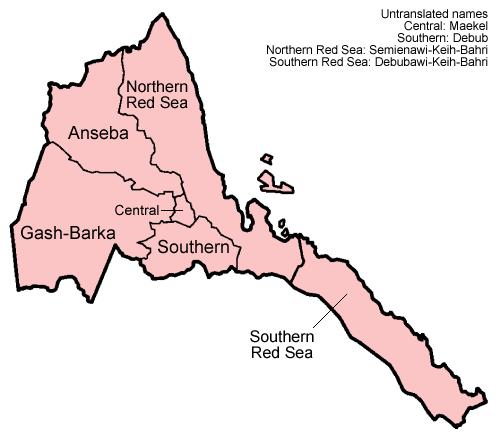 An off-the-map adventure in Eritrea
Catherine Fairweather and Don McCullin take a remote journey that could offer a model for post-pandemic African travel
Catherine Fairweather
https://www.ft.com/content/3b06927c-404 ... 01ad739c68
29-9-2020
An off-the-map adventure in Eritrea
Catherine Fairweather and Don McCullin take a remote journey that could offer a model for post-pandemic African travel
Catherine Fairweather
https://www.ft.com/content/3b06927c-404 ... 01ad739c68
29-9-2020
A beaten-up, canary-yellow Cinquecento parks up on the kerb outside Asmara’s Bar Tre Stelle, one of the older cafés in the Horn of Africa, and the driver toots until a waitress emerges. She brings a macchiato in a traditional glass tumbler and a custard cornetto (Italian croissant) and places them on the dashboard. The café, with its dusty interiors, pockmarked mirrors and chrome art deco fixtures untouched since the 1920s, feels like a time-warp.
Asmara was conceived as
Mussolini’s “
Piccola Roma”, the jewel in the colonial empire of 50 years, and the Italians left their mark, not just in the modernist architecture but also in the café culture that sets the city’s slow pace and convivial rhythm. I had heard that Tre Stelle’s pre-dawn opening hours and the strength of its dense espresso made it a favourite haunt of Eritrea’s authoritarian leader,
Isaias Afwerki, who has ruled the country as a one-party state since independence from Ethiopia in 1993. He is nowhere to be seen among the all-male clientele, impassive and immaculate in their three-piece suits and Borsalino hats.
A pensioner courteously heaves himself out of his café chair to make space for us, and then goes back to patiently stirring his cup, adding more sugar, measuring out his life in coffee spoons.
After the collapse of the Italian colony and the ensuing 30 years of war against Ethiopia, followed by decades of standoff and border disputes, for resident Asmaris it can feel like a country-in-waiting. The promised freedoms, recognition and investment that were dreamt of post-independence never arrived, the industry and employment were never delivered.
The clock, metaphorically, seems to have stopped circa 1950. The once shiny, futurist landmarks — such as the famous cantilevered Fiat service station designed by engineer
Giuseppe Petrazzi that imitates the sleek lines of an aeroplane — now shed paint and plaster just like our friendly pensioner’s cornetto crumbs.
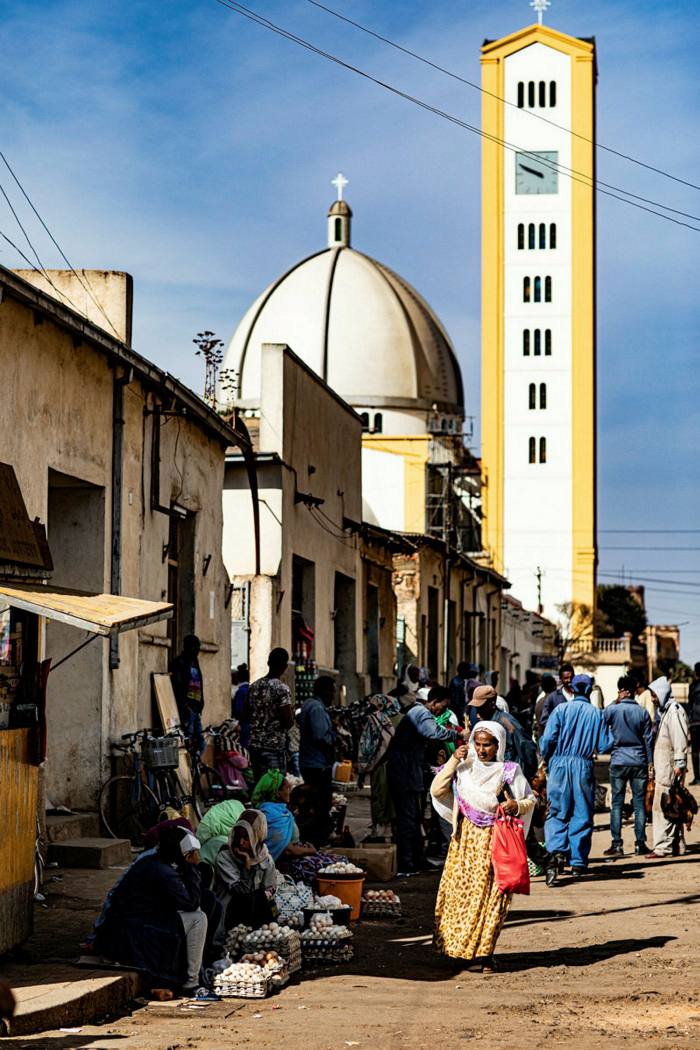 The capital city of Asmara, conceived as Mussolini’s ‘Piccola Roma’ © Don McCullin
The capital city of Asmara, conceived as Mussolini’s ‘Piccola Roma’ © Don McCullin
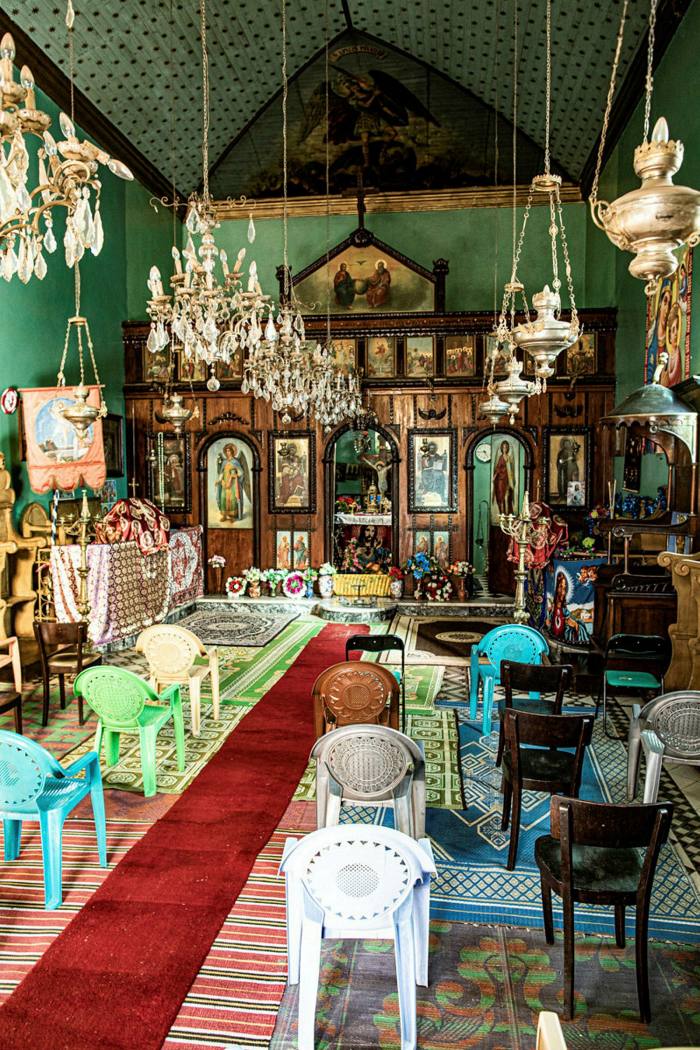 A church in Asmara © Don McCullin
A church in Asmara © Don McCullin
When I circumnavigate the “
keep out” fence around the Fiat station and step out on the “
wings”, I can see that they double as a kind of parasol and shelter for hay bales and goats below. Those once glamorous movie posters advertising the latest
Sophia Loren film hang tattered outside the restored, grand art deco portico of Cinema Impero, and like the rusted Kodak camera signs above every hardware store they serve to sharpen the whiff of nostalgia and impression of a lost era that has settled on Asmara’s tree-lined streets.
Rather than wings being clipped post-Covid, we might see growing demand for exploratory travel
Will Jones,
Journeys by Design
There are small concessions to the modern world, at Tre Stelle at least: a small TV screen is suspended over a vintage pool table in an adjacent room, and a newsflash of
Boris Johnson suddenly pops up. It reminds us of the existence of the outside world and the landmark date on which the UK officially divorces itself from the EU. The old boys of Tre Stelle seem to know who Johnson is and nod with approval.
You are now independent from Europe,
one leans in to comment.
Now you are on your own, like us, like Eritrea.
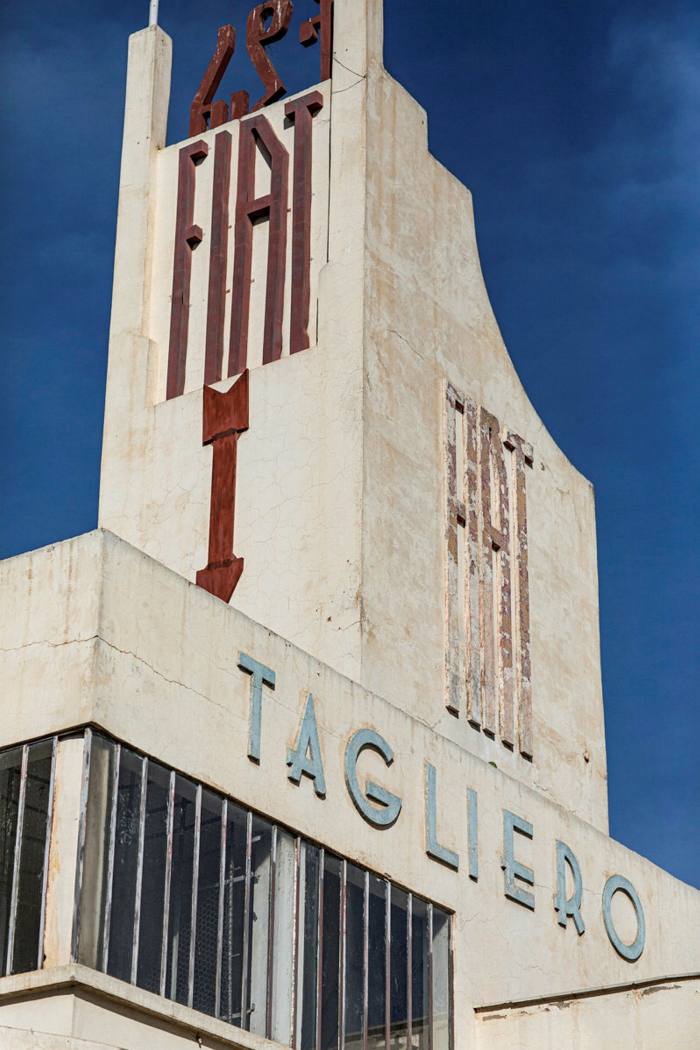 The futurist service station in Asmara, designed to look like a sleek aeroplane © Don McCullin
The futurist service station in Asmara, designed to look like a sleek aeroplane © Don McCullin
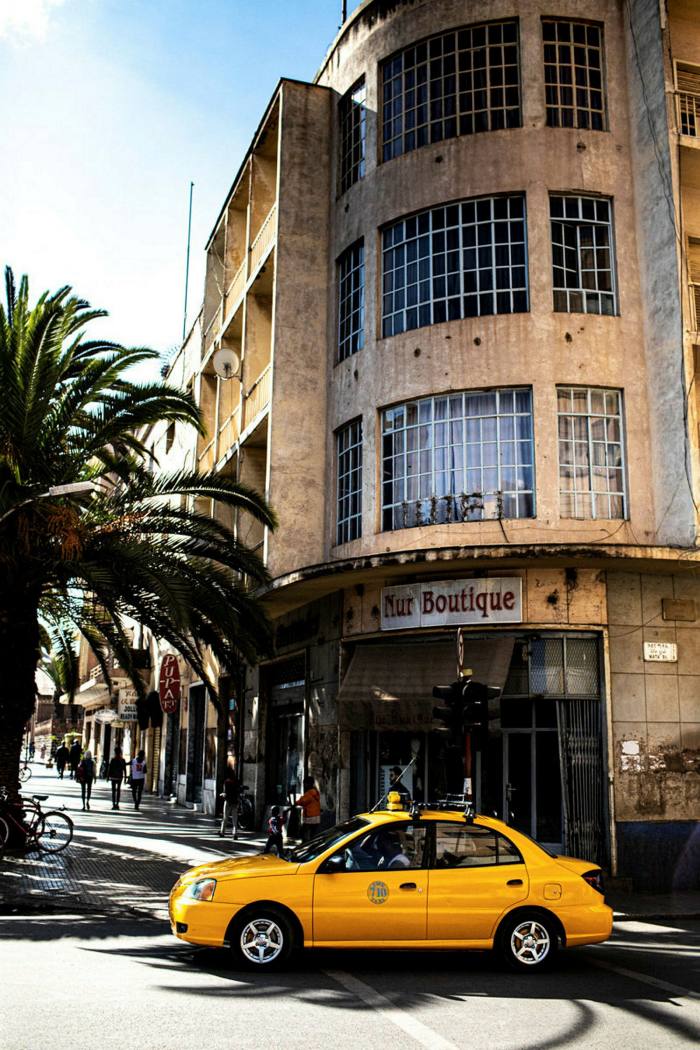 . . . and a hotel in the city centre© Don McCullin
. . . and a hotel in the city centre© Don McCullin
That Eritrea has a history of being overlooked had been highlighted for me by the blank stare I received from the assistant in the travel section of a main London branch of Waterstones. “
Where exactly?” she responded, when I asked for a recent and, as it turns out, non-existent guide book on the country.
But, with UN sanctions lifted and a Unesco preservation order bestowed on Asmara, followed by a peace accord between the Ethiopian and Eritrean premiers in 2018 and a subsequent Nobel Prize for the former, there has been a renewed sense of hope. Three new daily flights from Addis Ababa brought an easing of access for foreigners and a trickle of much-needed tourist dollars. The pandemic stopped all that, of course. We were travelling before the country’s borders closed in late March, since when they have remained shut. According to official figures there have been no Covid-related deaths.
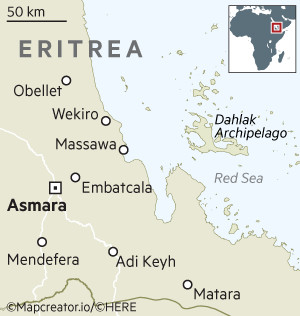 Eritrea map
Eritrea map
Our journey would take us from Asmara, at 2,325m above sea level, down to the coast, where we would travel north alongside the Rashaida tribe, before setting sail for the Dahlak archipelago. While currently off-limits, it is the kind of super-remote, off-grid itinerary, with a deep immersion in local culture and community, that some see as a model for low-volume, high-value post-pandemic tourism — and a stark alternative to ever-more luxurious safari lodges.
Rather than horizons contracting and wings being clipped post-Covid, we think we might see a growing demand for genuinely off-the-beaten track exploratory travel,
says
Will Jones, the founder of Journeys by Design, the tour operator that organised our trip.
Of course, the numbers of people travelling will be reduced, but the scope for them contributing to remote communities could be even greater.
Jones is planning to cut the number of departures it runs each year to a third of previous levels but with a focus on experiences not found in any brochure or website, and with a significant financial contribution to support conservation and community projects. He says he is already mainly working on departures scheduled for 2021 and 2022.
We are finding that clients are planning further ahead to confidently leap frog the Covid period, then wanting to spend more time on the ground to understand the destination in a more considered fashion.
------
We stock up for our expedition in the city’s vibrant markets, buying Keren oranges and acacia honey, and frankincense to scent the bonfires. Before government security men succeed in separating my photographer husband
Don McCullin from his camera at the lentil market, I haul him off to the terrace of the best Italian in town, The Spaghetti House, for penne all’arrabbiata and a bottle of Ethiopian cabernet. It tastes of communion wine.
Don, who was last in Eritrea in the 1970s covering the struggles of the ELF freedom fighters in the desert on a fruitless magazine mission with the journalist
Charles Glass, is not discouraged by his altercation at the food stalls. On the contrary, he is surprised by the city’s laid-back vibe, charmed by its warmth, its crowd-free, litter-free streets.
Over coffee, we agree we can put up with the lack of hot water and the non-functioning lightbulbs at our hotel, Albergo Italia, for the pleasure of the blowsy, baroque decor of the 1890s dining room and the hotel’s archive of cloth-bound newspapers giving the latest updates on Rommel’s second world war desert campaign.
Sitting in the gentle sun of the spring afternoon, above the palm-studded Liberty Avenue conceived for military parades and the greater glory of the fascist state, we can instead enjoy the spectacle of the passeggiata, which has the young and beautiful dressing up in their wedding finery and posing for formal photographs on the steps of the opulent 1930s Asmara Theatre opposite.
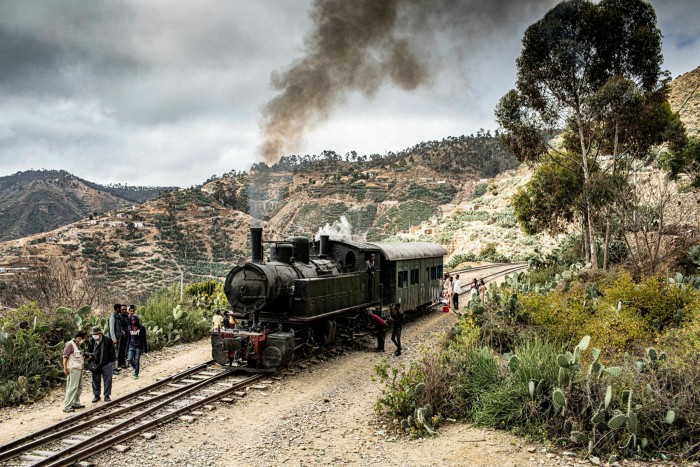 The steam train that Catherine and Don took to Embatcala: ‘Surely one of the great train journeys of the world’ © Don McCullin
The steam train that Catherine and Don took to Embatcala: ‘Surely one of the great train journeys of the world’ © Don McCullin
This is the flip side of a nation that you could be forgiven for thinking is defined by war. Our erudite guides spend days showing us some of the more moving cemeteries; the stunning art deco crypts for the Italians, the immaculately maintained walled monument to fallen British soldiers, and finally the so-called Tank Graveyard on the outskirts of town. The latter, a towering wall constructed from a stockpile of CCCP tanks, amphibious vehicles and US land cruisers, winds around the five-acre plot. It has the compelling if sinister power of an art installation at the Venice Biennale.
Amid the wreckage of a Russian armoured personnel carrier, someone has created a home. Cactus flowers sprout from the twisted metal carcass, and a pyramid of teff is being harvested for injera (flatbread), the dietary staple. There is a rudimentary bedroom arranged behind the gearbox and a little library of books on the dashboard — a human touch that poignantly undercuts the symbolic brutality of the place.
A litter of pups play with a flap of old goatskin, and the homeowner, the proud caretaker of the ponies cantering across the wasteland beyond, hopes, he says, that we will return next year, when he will be in better shape to offer us coffee.
Such generous-spirited, self-reliant resourcefulness is a striking Eritrean characteristic that we experience, memorably, on the country’s old steam train, which takes us out of the city on, surely, one of the great train journeys of the world.
We leave the city on a chilly morning, huffing slowly down through groves of eucalyptus, rattling around mist-filled gorges on an elaborate system of winding tracks, viaducts and tunnels. A girl roasts coffee beans over embers in the carriage on her recycled olive-oil-drum-turned-stove. Children wave from the terraced escarpment, where they coax a harvest of sorghum out of the rubble in green swatches. Built by the Italians in the 1920s, the train was resurrected lately by former rail workers coming out of retirement for free. They repurposed the tracks that were used to strengthen bunkers and trenches during the war.
At Embatcala, where the track currently ends, we disembark to find our car, and the British ambassador, out on his weekend constitutional, waving us off cheerily as he hikes back to the capital in the wake of the train.
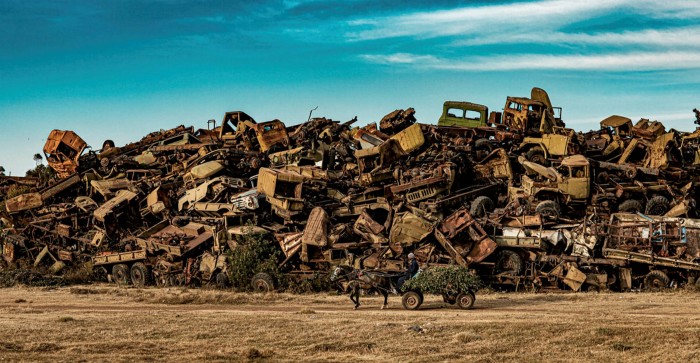 The Tank Graveyard on the outskirts of Asmara, a towering stockpile of CCCP tanks, amphibious vehicles and US land cruisers. © Don McCullin
The Tank Graveyard on the outskirts of Asmara, a towering stockpile of CCCP tanks, amphibious vehicles and US land cruisers. © Don McCullin
Ensconced now in the air-conditioned 4x4, eardrums popping, we drop 2,500m down off the Asmara escarpment through the acacia-studded Green Belt, dotted with beehives, into a different climate and landscape altogether. The tarmac runs out and the hot breath of the Red Sea sends ripples over the desert dunes and rivulets of sweat down our necks.
If Asmara feels like a hybrid of Africa and Europe, Massawa, the ancient trading hub and main deep-sea port of the Red Sea coast, is the imagined treasure trove of Arabia — here the promise of pearls, ivory and ostrich feathers bartered for precious salt, there the waft of scented spices, frankincense and myrrh traded on the sagging decks of the dhows and houris, since the time of the
Queen of Sheba and the Axumite empire of the second century AD.
It was always a melting pot of people: traders, slaves and slavers, fishermen and invaders from successive Persian, Roman, Turk, Egyptian and Italian incursions. They stamped their individual styles on the pediments, arcades, staircases and porticoes of the once-grand palaces, bazaar and warehouses.
After paying a visit to the covered market for supplies, we leave the city in the direction of Wadilo, travelling north along the coast towards the Red Sea Hills of Sudan. We are driving off the map, bumping over gravel and sand, following the slow-swaying caravan of camels driven by the turbaned Rashaida. One of the nine tribes of Eritrea, they migrated here from Saudi Arabia 150 years ago in the last famine and move up and down the Red Sea coast with their herds of goats and camels, following the rains. We spend the next few days with them, at the oasis where they herd their flocks and in their makeshift camps along the dunes.
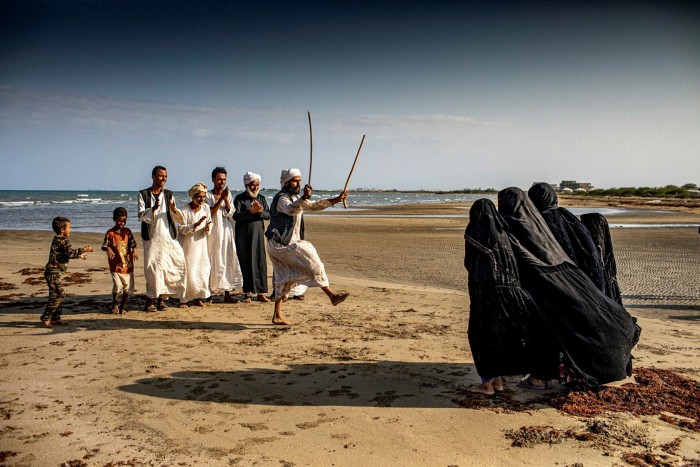 A traditional Rashaida dance performed with swords on a beach on the Red Sea coast. © Don McCullin
A traditional Rashaida dance performed with swords on a beach on the Red Sea coast. © Don McCullin
At the first encampment, we follow willingly as the Rashaida beckon us inside. Cardamom coffee is being brewed in an open-sided shelter made of woven goat hair, strung between poles over a pile of carpets that are laid out between the salt flats and a metallic sea. Nearby, our camp cook
Michele works his magic on a two-ring stove, transforming a goat that we bartered long and hard for into supper.
We share the slow-baked, spice-scented knuckles with
Ahmed, the Rashaida head honcho, his four wives and his 23 children. The babies, who have never eaten meat before, clutch the juicy chunks between their fists like rattles, unsure of what to do.
Then, in honour of the feast, our hosts spontaneously perform a traditional dance with swords and sticks on the beach, which shimmers, mirage-like, into the distance as far as Sudan, 600km away. Egrets and herons stalk the shallows, where stingrays try to bury themselves in the sand. An airborne pelican patrols the shoreline like a comedy-sketch policeman skimming over a tideline electrified with hermit crabs on the move. A horizon so wide and empty you can trace the curvature of the Earth can make you lose your bearings. Only the sound of the muezzin from distant Wekiro tethers you to the place.
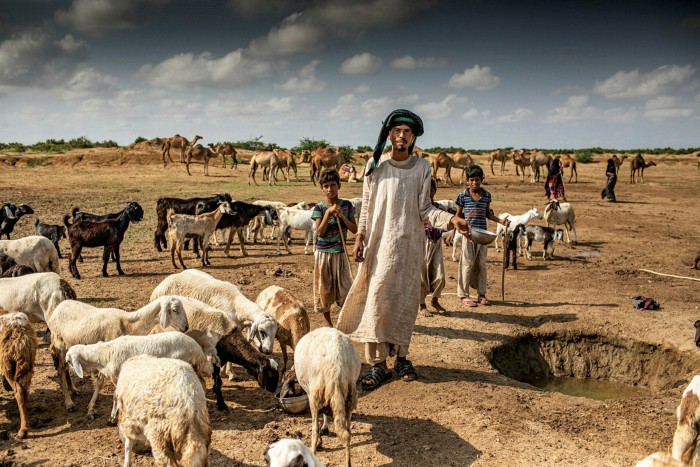 A villager from the Rashaida people, one of the nine tribes of Eritrea, takes the livestock to drink from the well. © Don McCullin
A villager from the Rashaida people, one of the nine tribes of Eritrea, takes the livestock to drink from the well. © Don McCullin
But if Wekiro is remote, then the Dahlaks, where we are bound next, are literally off the charts — about half of the 200 islands, some no larger than sandspits, are nameless, unmarked on
Google Maps; only a handful are inhabited. We board a large, robust skiff to carry us across the jade-coloured sea, empty but for a lone battered dhow with a bandana-clad crew, whom we spot on their deck praying in the direction of Mecca.
When they draw up alongside to exchange a couple of groupers for cans of Coke, I suggest they look like pirates. Our captain bats such glib observations sternly aside. “
At sea,” he proclaims, “
we are one, we share life.” So we share our food and anchorage with them on the white cuff of coral reef encircling an island called Dorghulla, which is deserted.
If Wekiro is remote, then the Dahlak islands, where we are bound next, are literally off the charts
Deserted, it turns out, but for huge colonies of breeding seabirds. Searching the hinterland for kindling, I stumble on a nest of osprey chicks balanced on top of a stumpy shrub. Snorkelling later, I breaststroke along the low-lying coral cliff, where brown-booby chicks poke their heads from the nooks. The adults divebomb as I float on my back, warning me away from the nests.
The creatures below, conversely, seem keen to come near, the [deleted] fish, angelfish and the odd turtle, tame as puppies, clustering around me on the pristine coral heads. A marine environment this untouched by tourism and commercial fishing, with better snorkelling than I have experienced anywhere (and that includes the Indian Ocean, Pacific, Caribbean or Arabian Gulf) is a rare Eden indeed.
Days pass, our contentment undiminished by the lack of “
things”. There are no showers — we bird-bath out of tin cups — and no bedrooms — we sleep under the flimsiest of mosquito nets. No lamps either; we eat by the light of the stars, all of us at table together — the cook, his sidekick, the captain and the guide, taking turns to collect and chop our firewood and catch our own fish suppers with a line and hook.
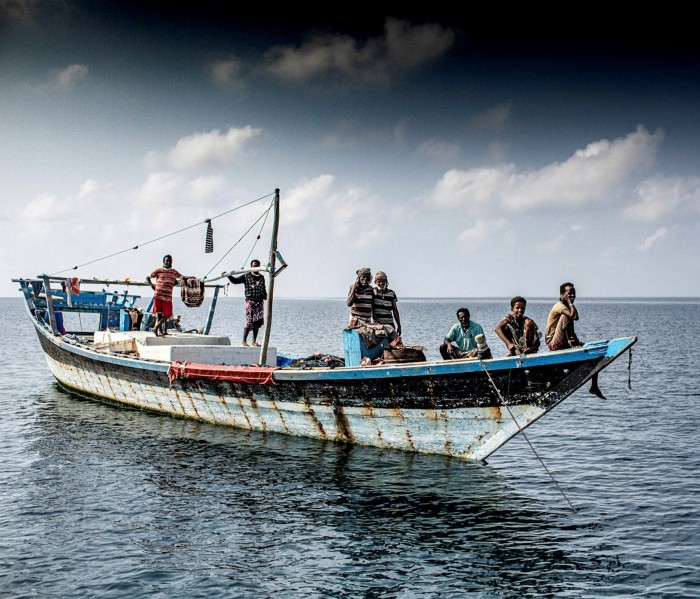 A dhow in the Dahlak archipelago: ‘We draw up alongside to exchange a couple of groupers for cans of Coke’. © Don McCullin
A dhow in the Dahlak archipelago: ‘We draw up alongside to exchange a couple of groupers for cans of Coke’. © Don McCullin
After such days of splendid and simple isolation, Massawa, celebrating Independence Day on our return, feels like a near-metropolis. We find Sallam’s Restaurant amid the pockmarked ruins of a piazza colonised by cats. It doesn’t look much from the outside and looks even less inside, but the Muslim owner allows us to order beer from the Coptic Christian store across the square and cooks up kingfish, Yemeni-style, in a tandoor with roti and chilli sauce. This is a menu with no choices, only the option of ordering your fish medium or large.
Don proclaims it the best he has eaten all week,
maybe the best meal of my whole life; the fish, this table, this moment, in this square.
I catch the emotion; it is evening and the celebratory fairy lights are flickering on. A syncopated drumbeat emerges from the makeshift bars in the souk and echo through the crumbling Ottoman arches. Warm breezes carry the hint of roasting coffee beans, the scent of burning embers and frankincense, the promise of the open sea.
And the promise of a rosy future perhaps?
quips
Filippo Gezatchew, our guide, in response to my romantic musings.
Well, here’s to hoping.
------
Details
Catherine Fairweather and Don McCullin were guests of Journeys by Design. It offers a two-week private trip from $9,750 per person, with an additional $5,000 contribution per group to Wild Philanthropy to fund conservation and community projects. The itinerary includes a private mobile camp with the Rashaida and on the Dahlak Islands and is privately guided throughout by Will Jones, founder of Journeys by Design.
Eritrea’s borders remain closed. The UK Foreign Office also advises against travel within 25km of the country’s land borders (with some exceptions)



















